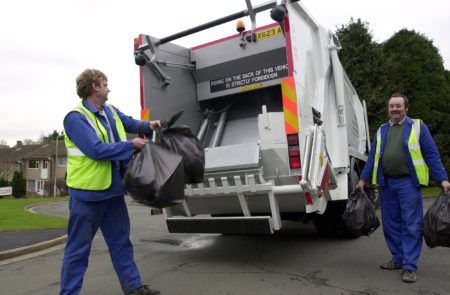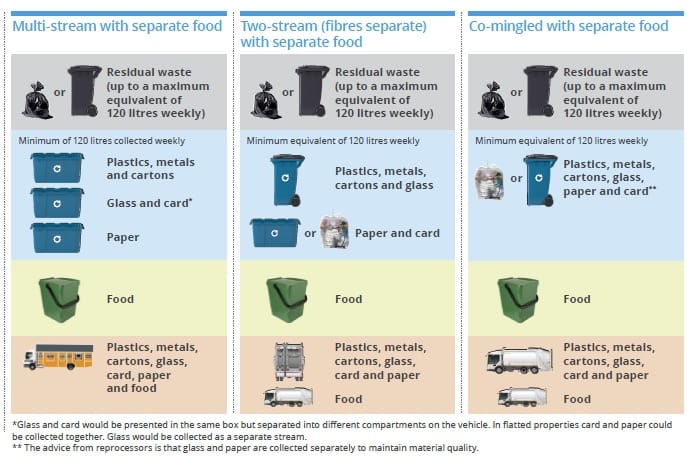Collaboration between councils, packaging producers and retailers is ‘essential’ if greater consistency of recycling systems is to be achieved, a conference in London heard yesterday (29 March).
The comments came from Chris Mills, special advisor at the resources and waste charity WRAP, who was speaking at the Collections Conference, organised by letsrecycle.com. Mr Mills’ presentation gave an overview of work taking place to support WRAP’s consistency framework – which aims to support ‘harmonisation’ of waste and recycling collection services between councils in England.
Mr Mills was one of three speakers during the ‘Connecting with the Customer’ session at the event which was held at the office of legal firm Pinsent Masons in London.
WRAP’s vision is that by 2025 packaging will be designed to be recyclable, and labelled clearly to indicate whether or not it can be recycled. Alongside this is the hope that virtually every household can recycle a common set of dry materials and food waste, collected in one of three ways.
The special advisor said that WRAP’s ‘consistency framework’ – which was published in October 2016 – would create greater cost effectiveness, increase the rate of recycling, produce higher quality material and improve environmental outcomes.
Consistency
Mr Mills claimed that currently councils have too many variations in the way that they collect recycling, making the process ‘too complex’ for householders. He claimed that this leads to inefficiencies in recycling collections.
As part of the consistency work, Mr Mills explained that 16 representatives from local authorities, waste management contractors, recyclers, producers and retailers have been brought together by WRAP, to form an advisory board. These include the Local Authority Recycling Advisory Committee (LARAC) and DEFRA.
WRAP has estimated that the cumulative benefits of councils aligning with the consistency framework could include savings of up to £33m in reduced costs to reprocessors from not having to remove contamination from materials before processing; around 682,000 homes supplied by renewable energy from food waste; and up to 5.1 million tonnes of CO2e avoided.
However, Mr Mills cautioned that one of the challenges for the project is that the scheme is voluntary for councils across England, who may not wish to spend time and money on changing services.
Mr Mills was followed by Trevor Nicoll, head of recycling, waste and fleet services for Newcastle-under-Lyme borough council, who discussed the council’s substantial changes to its collection service implemented from last July.
Mr Nicholl outlined the objectives for the new service as simplifying the system, reducing the cost for residents and achieving at least 55% of waste recycled by 2020.
Commenting of the aim of the service changes, Mr Nicholl said: “We wanted to make the service simpler, but also make a quality service.”
The service changes involved switching to weekly recycling, and replacing the possible nine separate containers and bags with a green box for glass and cardboard; a red box for metal and plastic bottles; and a blue box for paper, small waste electricals, batteries and textiles.
Newcastle-under-Lyme
The council also introduced new collection rounds and collection vehicles, began insourcing staff and operating a sorting and baling station. He warned delegates not to underestimate the amount of staff needed at the changeover for staffing the contact centre and also highlighted a spike in collected materials above a forecast 8% rise. He also advised councils to not let contact centre staff get involved in long time-consuming discussions with residents.
Communications was the theme of the third speaker, Amy Lloyd-Houldey, associate director of public sector communications and strategy consultancy Westco who outlined the company’s recent recycling campaign on behalf of Sutton council. Westco is wholly owned by Westminster city council.
“We wanted to make the service simpler, but also make a quality service.”
Trevor Nicoll
Newcastle-under-Lyme council
As part of the project, Sutton council allocated £200,000 to delivering a comprehensive communications campaign, between June 2015 and January 2017.
The company developed a ‘trigger tool’ in partnership with Ogilvy Change, which was used to collect data to inform the campaign. Westco’s director said the application was designed to test the residents’ recycling knowledge.
The tool gathered demographic information and was also used as an educational device, showing participants their results along with how they performed in comparison to other users.
Sutton
Ms Lloyd-Houldey said that the results concluded that recycling behaviour of residents in the borough was not dependent on demographics. The results also indicated that the intent to recycle was high, but that people were confused about which items could be recycled.
The campaign responded to these results by engaging through social media, establishing a group of ‘core collaborators’ to collect data and provide insight, and new ideas. The campaign also involved providing school workshops to educate children on the benefits of recycling, who would in turn influence the behaviour of their parents and carers.
The associate director said that the campaign succeeded in actively engaging community members, kick-starting peer-to-peer learning in schools, collecting data on recycling behaviour and providing a tool to collect data going forward.
The post WRAP calls for recycling consistency ‘collaboration’ appeared first on letsrecycle.com.
Source: letsrecycle.com Waste Managment





